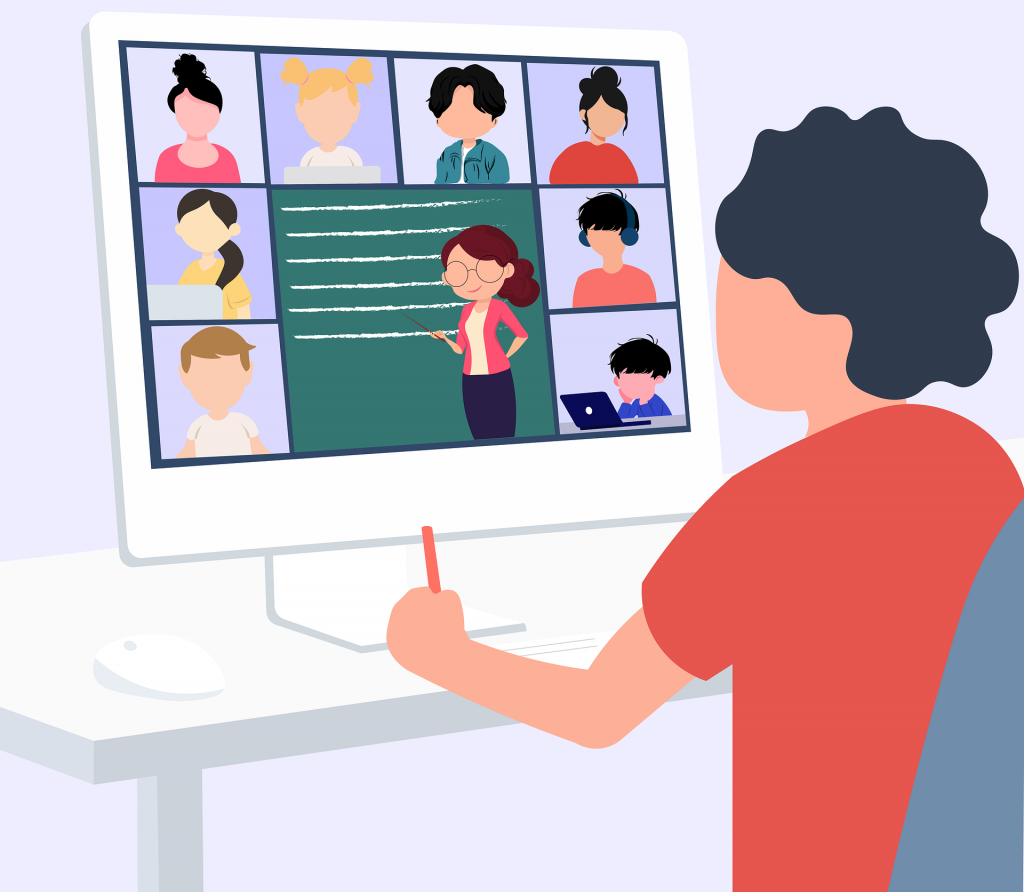The Covid-19 pandemic has changed everything, and education is one such field that has witnessed a major transformation. When schools were shut and students and teachers were confined in their homes, online learning came to rescue everything. So, here comes the question. What is the future of Education?
During the whole period of the pandemic, online learning not only ensured continuous learning but also transformed the way students learn. Interestingly, for the last few years, the online mode of learning was complimenting the physical mode of learning – but Covid-19 made it mainstream. Students came to know that it can be of a better use for learning where there is no requirement of hands-on training.

1. Bringing Classroom To Home
Online learning has brought classrooms to home. Millions of students are currently connected with their schools on their mobile phones, laptops and tablets. A score of apps is making up for the supplementary education required to ace school and competitive exams.
For instance, Filo lets students clear their doubts whenever they want. You can now learn a concept, ask help for in solving a particular question, or take complete classes at the tips of your smartphone. If this isn’t the future, we don’t know what is.

2. Online Learning Fulfilling Job Aspirations
Another reason why online learning is becoming prominent is – the population of government job aspirants. Every year there are lakhs of aspirants appear for various competitive exams in India – Such as the prestigious Civil Services Exam, SSC CGL, SSC CHSL, SBI PO, SBI Clerk, IBPS PO, IBPS Clerk, exams conducted by the Railway Recruitment Board (RRB), and others by State Public Service Commissions and other recruiting bodies. Pandemic challenged these aspirants. Those who had an edge, as they were already in a metropolitan city, continued their learning by shifting to an online mode of education. But it remained a huge challenge for many aspirants from tier 2 and tier 3 cities.
Coaching institutes found it an opportunity to expand their wings. With an excessive focus on online learning, these coaches started innovating in ed-tech. From Filo to Byjus everyone recruited good teachers who were comfortable with online teaching. These coachings started offering very economical modules for the preparation of an exam, like for Unacademy offered courses for SSC- CGL exam in around six thousand, while offline this course could cost up to nine thousand.
One can gauge the rising importance of online learning by seeing the viewership of youTube channels of teachers who teach online. Pandemic gave a huge push for that – teachers became celebrities through online teaching like for instance Khan sir.
3. A Big Leveler
In India, the financial background of individuals is a big obstruction in achieving goals. But the online mode of education can be a big leveller, if used properly. The kind of resources a person can access online is huge. The government is also finding the best way to offer online courses free of cost to students who can’t afford them otherwise, for example, the variety of courses offered under the Swayam Central.

Brilliant lectures from eminent teachers from across the world are available on YouTube. So if someone has merely an internet, it can open up multiple avenues of learning. Also now universities are developing special programs for students with disabilities.
4. Online Degree Courses
Various universities and institutes now offer online degrees and courses. Initially, in open and distance learning programs, most of the lectures were covered through material sent by post and offline lectures. Now gradually and steadily, and the information technology (IT) infrastructure straightened, the postal method started supplementing online learning – a hybrid method of learning developed and with a push by pandemic, it has paved the way forward.
Online examinations are getting rapidly accepted due to various avenues to assess students, and easy ways to check their learning outcomes. Now, institutes are focusing on improving the handling of question papers, answer scripts, exam room scheduling, arranging invigilators, coordinating with examiners, etc.
IGNOU, state open universities and the Ministry of Education have been dominating when it comes to open and distance learning. But private and other state-sponsored universities latched on to the huge opportunity by offering multiple courses online.
Adding e-content like the National Programme on Technology Enhanced Learning (NPTEL) created by the Indian Institute of Technologies (IITs) for engineering students is becoming hugely popular and gaining currency among students. Now one can do courses from universities like Harvard, Stanford on their phone.
Centre’s Efforts to Push Online Learning
The state is also aware of the potential that the online mode of learning has since India has over 35 million students enrolled in higher education. The National Education Policy (NEP) 2020 envisaged a target of 50 per cent gross enrollment Ratio GER by 2035, which means, the government has to prioritize online mode of learning. The New Education Policy (NEP) studied the provision of multi-point entry-exits and credit points. To bring that, the government is planning to facilitate an adequate atmosphere for online learning.
Frequently Asked Questions (FAQs)
Does online learning halt all existing modes of learning?
No, it doesn’t. In fact, online learning complements learning, as it offers multiple ways to impart skills and gain knowledge.
Does online education distract young students
It depends on a lot of factors. Online learning is not a panacea, it has its own pros and cons and it depends on the person and his/her guardian.
Will I get addicted to screen?
Online learning doesn’t mean you are supposed to stick onto your phone screen all the time. Online learning means you are using resources available online for your learning. The threat of addiction is there when you don’t use your device properly. Here the role of parents becomes prominent. Experts believe that online learning should happen under the guidance of parents.
Does it make kids vulnerable to cybercrimes?
Threat is there. But you can not eliminate online education for that. Online education is a great assistance in learning, the threat of crime is as much as in offline mode.
Is online learning for everyone?
This is the USP of online learning. It doesn’t discriminate. All you need is a device with an internet connection. It has hugely helped people with disabilities too.
Summing Up!
No doubt that online learning is the future. And there is no escape. The increasing use of graphics and artificial intelligence made learning fun. The emerging new model of learning is “Hybrid learning” – a mix of face-to-face lectures and online learning. The government is realizing that and working on making learning not only accessible but also fun. The push by pandemic has transformed online learning as it has given way to many ed-tech startups and above all, it played the role of leveller.
Still not convinced? Want to unravel more about the nuances of an Online learning; Come and Visit Filo; and get on with one-on-one interaction with tutors on any topic and at any time!

